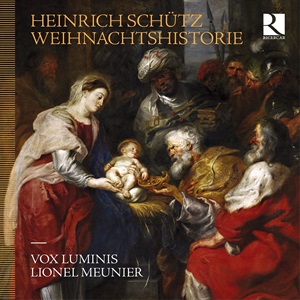
Heinrich Schütz (1585-1672)
Wehnachtshistorie
Vox Luminis/Lionel Meunier
rec. 2024, Église Notre-Dame, Gedinne, Belgium
Booklet notes and full texts in German, English and French
Ricercar RIC467 [74]
Heinrich Schütz was the greatest German composer of the 17th century. His Christmas Story (Weihnachtshistorie or Historia der Geburt Jesu Christi) is the finest Christmas music we rarely seem to hear at Christmas, or for that matter any other time. It formed a template for the genre as it was to become in the next century, but is well worth hearing in its own right rather than an as important artefact of musical history. There are the expected omissions or options with such an old score. The text Vox Luminis use for this recording has been reconstructed from manuscript sources in the Düben Collection in Uppsala. I cannot comment on the musicology, but the outcome is very satisfying.
The Weihnachtshistorie fills exactly half of the album’s time. The next biggest work is Schütz’s eleven-minute Magnificat. The disc is rounded out with motets for the Christmas period by Schütz and his once equally admired contemporary Andreas Hammerschmidt, and a chorale by Michael Praetorius. Of the latter, the booklet says: “A German Baroque Christmas programme would be inconceivable without the gentle poetry of the famous chorale Es ist ein Ros’ entsprungen, here in the only known polyphonic setting of this chorale in the entire German Baroque repertoire.” But each of preceding seven numbers makes its mark. The disc becomes a representative compilation of its era and genre, rather than a ‘major work plus fillers’ programme. In particular, if Hammerschmidt is a new name to you as he was to me, you will surely be delighted to make the acquaintance of his music.
That still leaves the Weihnachtshistorie to top the bill, which it is well-designed to do. Its declamatory style and use of continuo to support the narrations of a tenor Evangelist are familiar from Bach’s Passions and indeed his Christmas Oratorio. The colourful instrumentation, too, will reappear in 18th century examples. Schütz uses violins and bassoon to accompany the angelic choir and the Three Kings (three tenors). Pastoral flutes introduce and accompany the shepherds (three altos). Two violas support the Angel (soprano), two trombones impart solemnity to the high priests (four basses), and two trumpets – maybe rather few for a tetrarch – ensure we attend when Herod (bass) eventually has something to say. The historic instruments have the period sound and charm we expect.
Vox Luminis’s Florian Sievers is a plangent-toned Evangelist, eloquent by virtue of his very restraint, an unassuming narrator of momentous events. His closing narration is especially touching. Erika Tandiono delivers the Angel’s appearances to the shepherds and Joseph with annunciatory dignity and pathos (the viols provide a halo to her sound). The opening and closing choruses are double choruses, a dialogue between voices and instruments. The instrumentalists of Vox Luminis play it all splendidly. Indeed, one wonders how, seeing so few players and singers in the booklet photo, they can have such a sonorous effect at times, and especially in the joyous conclusion to the work. The firm bass presence there and elsewhere is not the least aspect of the sonic appeal of this impressive recording. The booklet is full and informative enough to cover each of the eight items. As a valuable repertoire compilation, the disc has the field to itself.
Roy Westbrook
Buying this recording via a link below generates revenue for MWI and helps us keep free access to the site



Contents:
Heinrich Schütz (1585-1672)
Weihnachtshistorie (Historia der Geburt Jesus Christi) SWV435 (1664)
Magnificat Anima Mea Dominum, SWV468
O bone Jesu, fili Mariae, SWV 471
Andreas Hammerschmidt (c.1611-1675)
Machet die Tore weit (1671)
Ehre seit Gott in der Höhe (1646)
Alleluia, freuet euch, ihr Christen alle (1646)
Freude, Freude, große Freude (1653)
Michael Praetorius (1571–1621)
Es ist ein Ros’ entsprungen

















